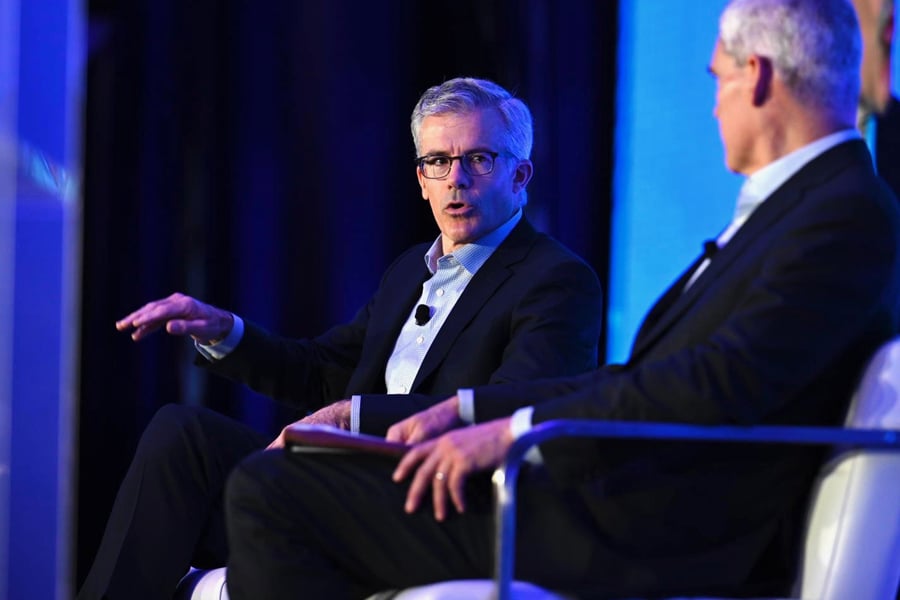

Vanguard Group chairman and CEO Tim Buckley embraced artificial intelligence but tiptoed around ESG investing at an industry conference Wednesday.
What had been a typically breezy onstage conversation between Buckley and Tom Faust, chairman of Morgan Stanley Investment Management, suddenly came to a halt when Faust asked Buckley to comment on ESG. Faust noted the topic has stoked political passion on the right and left.
Buckley paused. “We’ve run out of time,” he said, to laughter among the 752 audience members at the Investment Company Institute Leadership Summit in Washington.
Vanguard has been criticized by climate-change activists for withdrawing from the high-profile Net Zero Asset Managers initiative in December.
Buckley then carefully explained how Vanguard views using environmental, social and governance factors when selecting investments and implementing investment strategies.
“The objective’s quite clear: Make sure our clients win,” he said.
That requires maximizing long-term returns. The vast majority of Vanguard investors don't apply an ESG lens to their portfolios, Buckley said. For those who do, the firm provides “diversified building blocks” — investments that enable them to utilize that strategy.
Although ESG has dominated investing and political discussions over the past few years, Buckley cautioned that it's not the equivalent of the advent of money-market funds or exchange-traded funds.
“ESG funds are not the next great innovation," he said. “They’re a client preference, and we need to treat it as such.”
The Securities and Exchange Commission is working on several ESG proposals. On a separate ICI panel, a fund official said she hopes new rules will make it easier to discern and explain whether ESG investing is good for clients.
Regulation that makes ESG more transparent would make it "less political and more straightforward for all of us to make good investment decisions [and] would be very welcome," said Lisa Jones, CEO of Amundi US Inc.
When the conversation between Buckley and Faust moved to artificial intelligence, Buckley expressed enthusiasm about the promise the technology holds for the funds sector.
He used an example of how AI can make writing and editing much more efficient. A Ph.D. might write a 30-page paper for the Journal of Portfolio Management that had only a limited audience, Buckley said, but a single editor using AI could distill it into two or three pages for dissemination to a wider audience.
An editor augmented by AI could also pull four highlights from a 30-minute video on a market trend, quickly post it on social media and send it to several different countries.
“What five people would take a week to do, they’re doing in a morning,” Buckley said.
AI technology can help staff do “routine cognitive” work and free them up for more challenging and creative tasks that require deeper thought. “We’ll move up to that higher-order thinking where we can add more and more value for our clients,” he said.
On her panel, Jones said that AI is a potentially a transformative “game changer in our lives.”
But she doesn’t see it threatening the investment advice profession. During a “yes-no” rapid-answer segment, she was asked whether AI would replace all but the top financial advisors.
“No,” Jones said.

Rajesh Markan earlier this year pleaded guilty to one count of criminal fraud related to his sale of fake investments to 10 clients totaling $2.9 million.

From building trust to steering through emotions and responding to client challenges, new advisors need human skills to shape the future of the advice industry.

"The outcome is correct, but it's disappointing that FINRA had ample opportunity to investigate the merits of clients' allegations in these claims, including the testimony in the three investor arbitrations with hearings," Jeff Erez, a plaintiff's attorney representing a large portion of the Stifel clients, said.

Chair also praised the passage of stablecoin legislation this week.

Maridea Wealth Management's deal in Chicago, Illinois is its first after securing a strategic investment in April.
Orion's Tom Wilson on delivering coordinated, high-touch service in a world where returns alone no longer set you apart.
Barely a decade old, registered index-linked annuities have quickly surged in popularity, thanks to their unique blend of protection and growth potential—an appealing option for investors looking to chart a steadier course through today's choppy market waters, says Myles Lambert, Brighthouse Financial.
